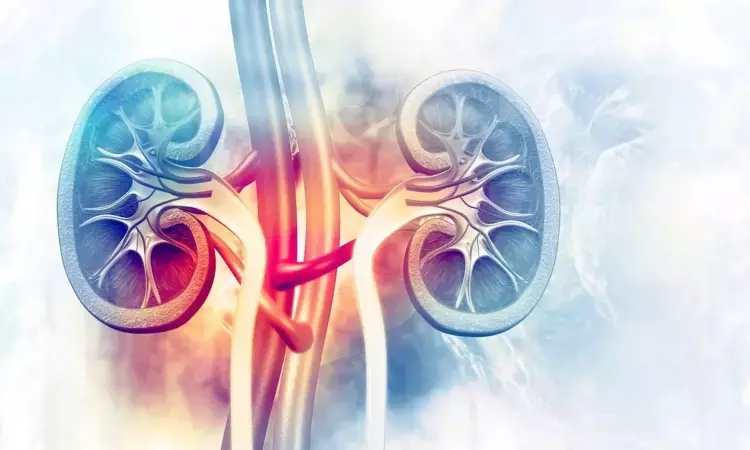- Home
- Medical news & Guidelines
- Anesthesiology
- Cardiology and CTVS
- Critical Care
- Dentistry
- Dermatology
- Diabetes and Endocrinology
- ENT
- Gastroenterology
- Medicine
- Nephrology
- Neurology
- Obstretics-Gynaecology
- Oncology
- Ophthalmology
- Orthopaedics
- Pediatrics-Neonatology
- Psychiatry
- Pulmonology
- Radiology
- Surgery
- Urology
- Laboratory Medicine
- Diet
- Nursing
- Paramedical
- Physiotherapy
- Health news
- Fact Check
- Bone Health Fact Check
- Brain Health Fact Check
- Cancer Related Fact Check
- Child Care Fact Check
- Dental and oral health fact check
- Diabetes and metabolic health fact check
- Diet and Nutrition Fact Check
- Eye and ENT Care Fact Check
- Fitness fact check
- Gut health fact check
- Heart health fact check
- Kidney health fact check
- Medical education fact check
- Men's health fact check
- Respiratory fact check
- Skin and hair care fact check
- Vaccine and Immunization fact check
- Women's health fact check
- AYUSH
- State News
- Andaman and Nicobar Islands
- Andhra Pradesh
- Arunachal Pradesh
- Assam
- Bihar
- Chandigarh
- Chattisgarh
- Dadra and Nagar Haveli
- Daman and Diu
- Delhi
- Goa
- Gujarat
- Haryana
- Himachal Pradesh
- Jammu & Kashmir
- Jharkhand
- Karnataka
- Kerala
- Ladakh
- Lakshadweep
- Madhya Pradesh
- Maharashtra
- Manipur
- Meghalaya
- Mizoram
- Nagaland
- Odisha
- Puducherry
- Punjab
- Rajasthan
- Sikkim
- Tamil Nadu
- Telangana
- Tripura
- Uttar Pradesh
- Uttrakhand
- West Bengal
- Medical Education
- Industry
Inorganic nitrate reduces contrast-induced nephropathy among patients undergoing angiography

UK: Inorganic nitrate improves the safety of coronary angiography for patients at risk of renal injury, results from the NITRATE-CIN trial have shown.
The findings, presented at ESC (European Society of Cardiology) Congress 2023, revealed that inorganic nitrate reduced CIN (contrast-induced nephropathy), improved renal outcomes and reduced cardiac events versus placebo in patients at renal injury risk undergoing coronary angiography for acute coronary syndrome.
In patients presenting with heart attacks at risk of kidney injury from invasive coronary angiography, the researchers found that a short course, which was 5 days, of inorganic dietary nitrate resulted in reduced contrast-induced kidney disease by 70%.
Contrast-induced kidney injury from angiography is tied to worse long-term kidney function including dialysis, longer hospital stay, greater risk for death, and greater risk for recurrent CV events.
The trial by Dan Jones, MBBS, clinical senior lecturer of clinical trials in cardiovascular intervention and honorary consultant in interventional cardiology at Queen Mary University of London, included 640 patients (73% were men) with non-ST segment elevation ACS referred for invasive coronary angiography at high risk for contrast-induced kidney injury. High risk was defined as having chronic kidney disease (eGFR < 60 mL/min/1.73 m2) or at least two of the following risk factors: liver failure, diabetes, exposure to contrast within the past 7 days, age older than 70 years, HF or concomitant use of renally acting drugs. The patient's mean age was 71 years.
Patients were randomly assigned to 5 days of potassium nitrate (12 mmol/744 mg nitrate) or a placebo of potassium chloride, with the first dose taken before the procedure.
The study led to the following findings:
- Contrast-induced acute kidney injury occurred in 9.1% of the nitrate group and 30.5% of the control group, for a relative risk reduction of 70%.
- Kidney function in the nitrate group improved by 5.2 mL/min/1.73 m2 at 3 months, for a relative improvement of 10%.
- Secondary outcomes were improved with inorganic nitrate vs. placebo, with lower rates of procedural myocardial infarction (2.7% vs. 12.5%).
- At 1 year, major cardiac events, defined as death, MI or repeat revascularization, occurred in 9.1% of the nitrate group and 18.1% of the placebo group, for a relative reduction of 50%.
- Kidney events at 1 year occurred in 10.7% of the nitrate group and 28.4% of the placebo group, for a relative reduction of 60%.
"These findings could have important implications for health systems by reducing CIN burden and the associated prolonged admissions, significant costs, and dialysis" researchers concluded. "Further studies powered for adverse cardiac events are needed to confirm these findings."
Dr Kamal Kant Kohli-MBBS, DTCD- a chest specialist with more than 30 years of practice and a flair for writing clinical articles, Dr Kamal Kant Kohli joined Medical Dialogues as a Chief Editor of Medical News. Besides writing articles, as an editor, he proofreads and verifies all the medical content published on Medical Dialogues including those coming from journals, studies,medical conferences,guidelines etc. Email: drkohli@medicaldialogues.in. Contact no. 011-43720751


